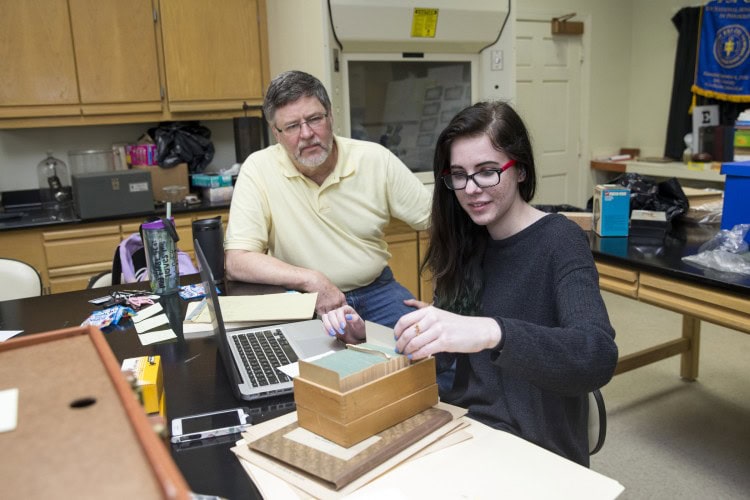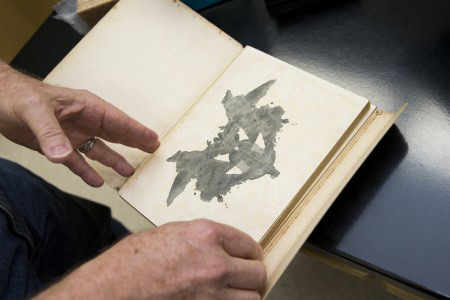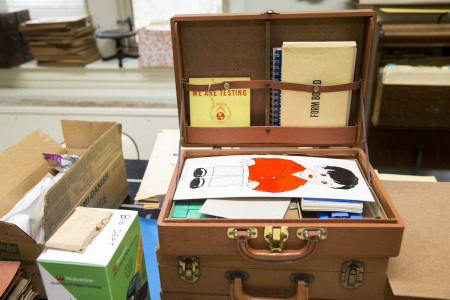Summer research project tests the minds of Randolph student, professor

Professor of Psychology Rick Barnes and Sarah Ballard-Abbott ’16 look through historic psychological tests in the College’s psychology lab.
Randolph College’s psychology lab was founded in 1891-the same year as the institution itself-and was one of the first 20 such collegiate labs in the country.
“That makes some of the equipment and tests we have here really historically valuable,” said psychology and environmental studies professor Rick Barnes, who is partnering with Sarah Ballard-Abbott ’16 for her summer research project, entitled “Exploring Early Psychological Tests: Researching the Randolph College Collection.”
A psychology major from Arlington, Virginia, Ballard-Abbott’s effort is a continuation of a semester project she conducted last fall in Barnes’ History of Psychology course, for which she took a brief inventory of all the intelligence, personality, and other tests stored in the lab’s filing cabinets and presented her findings to the class.
This summer she and Barnes are rummaging through more filing cabinets, as well as cardboard boxes, closets, and wooden shelves to discover more about the way psychological tests were demonstrated and practiced at the College over the years. One of Ballard-Abbott’s favorite discoveries so far was a Tree Test from 1952. For the test, subjects drew a tree to assess their personality.
“I ended up drawing my own little tree, and this demonstrates I have no grasp on reality,” she laughed, holding up a black ink pen drawing of a tree.
Other notable finds include a Wiggly Block Test, which was used to gauge a subject’s ability to visualize three dimensions of space by scoring them on their skill and speed at putting the block puzzle together. Ballard-Abbott also found the original prints of a 1921 Rorschach Inkblot Test. This personality and emotional test has been widely used over the years to diagnose thought disorders.
However, the oldest test Ballard-Abbott has discovered thus far is a Healy Pictorial Completion Test, which she found was manufactured in 1914. Used as a juvenile aptitude test, children were given an illustrated scene with missing pieces and scored based on their choices of pieces used to fill in the spaces.
Ballard-Abbott has enjoyed researching the tests she has found and learning how the study of psychology and the human mind has changed over the last 100 years. Upon completion of her undergraduate studies at Randolph, she plans to attend graduate school and earn her Ph.D. in clinical psychology. She wants to one day work as a college professor or in a hospital.

Psychology and environmental studies professor Rick Barnes opens an original printing of a set of Rorschach inkblots from the 1920’s.
“The coolest thing is really looking at how tests evolve over time. You can look at some of the earliest ones and see how incredibly culturally biased it is,” she said. “But they’ve become more objective and reasonable over time. I look forward to spending at least another 20 years working in psychology and seeing how things continue to change.”
Besides preserving the College’s psychological test collection, Ballard-Abbott is also spending her summer archiving each of her discoveries online. Barnes said much of the department’s equipment, most of which is displayed on the second floor of the Psychology Building, was documented and catalogued in the Center for the History of Psychology’s online database as part of another summer research project in 2006, but before this summer there was no digital record of the hundreds of tests stored at the College.
“There are other schools that have similar kinds of collections, but probably not too many have the range of types and ages of tests that we have,” said Barnes. “We want to make the inventory available online so if there are researchers looking at the history of psychology they can have access to it.”
With six weeks remaining in the summer research program, Ballard-Abbott said she had already found and documented more than 150 tests, and has many more to examine. She is working to upload her findings to the websites for both the Randolph College Natural History and Archaeology Collections as well as the Center for the History of Psychology.
The tests she has archived so far can be found at https://ehive.com/account/5889.
“The more we do this, the more we learn about how we do it, so Sarah is doing a really thorough job of obtaining information about the tests. We now have better information about the tests than we do about the equipment upstairs,” said Barnes.
Tags: psychology, Randolph College Natural History and Archaeology Collections, Sarah Ballard-Abbott, summer research, Summer research 2015

